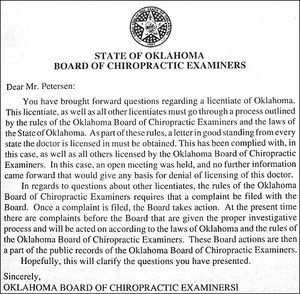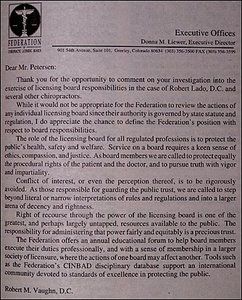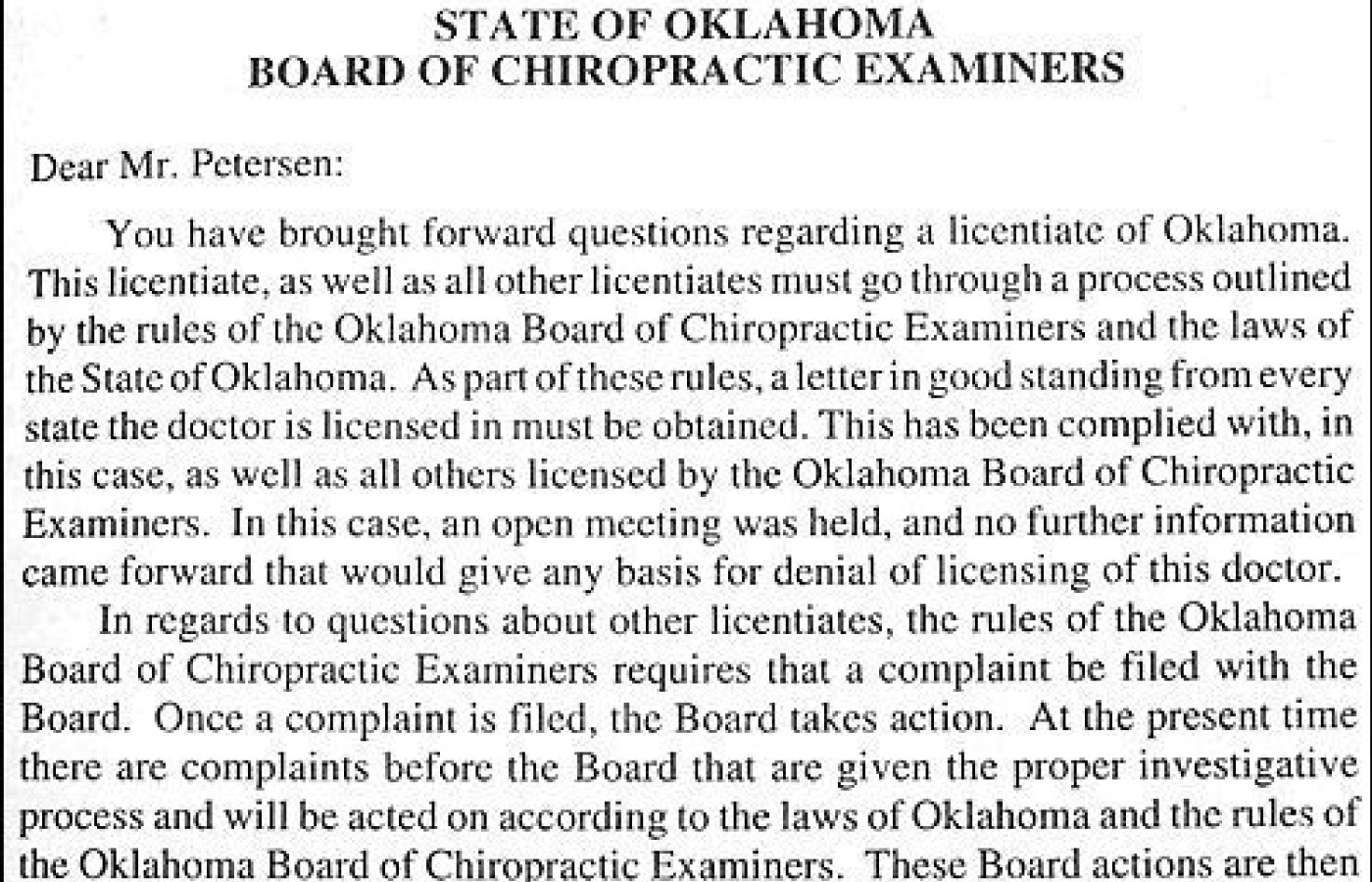Some doctors thrive in a personality-based clinic and have a loyal following no matter what services or equipment they offer, but for most chiropractic offices who are trying to grow and expand, new equipment purchases help us stay relevant and continue to service our client base in the best, most up-to-date manner possible. So, regarding equipment purchasing: should you lease, get a bank loan, or pay cash?
Chiropractic Licensing Boards -- Are They Doing the Job?
The concepts underlying our need for chiropractic licensing boards are as old as the U.S. Constitution. The licensing boards give the profession the power of self-determination, and the means to insure internal integrity. The boards also exist to protect the public by upholding the ethical and professional standards of health care as they apply to chiropractic.
But it remains to be seen how good of a job the chiropractic state licensing boards are really doing. What happens when two licensing board need to work together? Are the laws supporting the chiropractic licensing boards effective enough? Do the actions of the licensing boards affect how the public and the media view the chiropractic profession?
The case of one DC, Robert Lado, illustrates some of the problems and confusions involving chiropractic licensing board actions. It is a story revolving around lack of communication and dearth of information. It began 13 years ago in 1982, when Dr. Lado had a encounter with the Michigan Chiropractic Licensing Board. He was charged with exceeding the scope of chiropractic practice, the result of which was an agreed stipulation of one week suspended license and one year probation.
Three years later in 1985, a local Michigan television station ran a week-long series of news reports on Dr. Lado regarding practices that the investigative reporter found questionable, including recruiting and billing. Sometime afterwards, Dr. Lado moved from Michigan to Kansas. For some reason, the action by the Michigan Board and the negative television exposure did not affect Dr. Lado's ability to obtain and maintain licenses in Kansas, Missouri, Iowa, Kentucky, Texas, and West Virginia.
Dr. Lado's next involvement with a chiropractic licensing board occurred in Kansas. On November 6, 1992, the Kansas Board of Healing Arts filed an emergency petition to temporarily suspend Dr. Lado's license "based upon a probable cause that the licensee's continuation of unrestricted practice would constitute an imminent danger to the public health and safety."
Following up on the emergency petition, on April 15, 1993 the Kansas Board (a multi-disciplinary licensing board) charged Dr. Lado with eleven counts:
- Failure to "seek an examination from a person (MD) designated by the board."
- Failure to abide by a "Reasonable Suspicion Order ... based on information which indicated that Licensee may have the inability to practice chiropractic with reasonable skill and safety to patients by reason of illness, alcoholism, excessive use of drugs, controlled substances, chemical or other type of material or as a result of any mental or physical condition."
- Failure to provide the Board with requested information.
- Unprofessional Conduct "by representing to the patient that a manifestly incurable condition or injury could be cured."
8. Acts of "sexual abuse, misconduct or exploitation related to the Licensee's professional practice."Almost a year later on March 13, 1994 (with the Kansas case still unsettled) the St. Joseph (Missouri) News-Press featured an article on Dr. Lado. The article discussed the pending action against Dr. Lado in Kansas and recounted the Michigan television news series which cited Dr. Lado for "improprieties ranging from the unethical to the bizarre." The article also discussed Dr. Lado's efforts to be licensed in Oklahoma. Staff Writer Cheryl Wittenauer quoted Lawrence Buening, exective director of the Kansas Board of Healing Arts as saying, "To date Oklahoma has received letters of good standing from all the states except Kansas, that, too, will arrive, but it will state there is a case against Robert Lado."9. Performing "unnecessary tests, examinations or services which had no legitimate medical purpose."
10. Violation of Healing Arts Act.
11. Failure "to practice the healing arts with the level of care, skill and treatment recognized by a reasonably prudent similar practitioner as being acceptable under similar conditions and circumstances."
On October 14, 1994, the Kansas Board sent a letter to the Oklahoma Board stating:
"Dr. Robert Lado is and has been entitled to engage in the practice of chiropractic in the State of Kansas, having been issued license number 001-03984 on August 11, 1990. Since that date, Dr. Lado has held a current license to engage in the practice of chiropractic in the State of Kansas, having last renewed his license on July 6, 1994. As of the date of this letter, Dr. Lado's Kansas license has never been revoked, suspended, or otherwise limited."On the next day, October 15th (a Saturday), the Kansas Board and Dr. Lado signed a "Stipulation and Agreement." Among other things, the agreement contains a statement where Dr. Lado denies "all of the allegations" and the Board "alleges that the allegations contained in the Amended Petition are true." Dr. Lado voluntarily agreed to stop practicing in Kansas through June 30, 1995 (when his license expired) and not seek a new license until after June 30, 1998. According to Kansas Board Executive Director Lawrence Buening, the stipulation is considered a disciplinary action. In addition, Mr. Buening sent a copy of the Kansas action to the Oklahoma Board on October 17th.
The October 18, 1994 issue of the St. Joseph News-Press contained another article re-describing the Lado incident and the new settlement. When "DC" contacted her, News-Press Staff Writer Cheryl Wittenaur said that she had informed the Oklahoma Board of the Kansas Boards' activities against Dr. Lado during the course of her reporting.
On October 21, 1994, the result of Kansas' dealings with Dr. Lado arrived at the office of the Federation of Chiropractic Licensing Boards (FCLB). Because the Oklahoma Board of Chiropractic Examiners was not on-line with the CINBAD computer network (a free service to the chiropractic licensing boards), the FCLB sent the Lado documents directly to them on October 28th. The information was entered into the CINBAD computer network on November 3rd.
At a meeting on December 8, 1994, the Oklahoma Board voted to grant Dr. Lado a license. At that time, the board consisted of four members, three of them chiropractors. The three were Tom F. Smith, DC, president; Kenneth A. Cherry, DC, secretary/treasurer; and Brad Hayes, DC. Dr. Hayes joined the board in July 1994 and stated that this was his first meeting. According to Dr. Hayes, none of the information pertaining to the action in Kansas against Dr. Lado was available to him when the board decided to grant the DC his Oklahoma license.
In the process of collecting the information on this action, Dynamic Chiropractic contacted all of the state boards where Dr. Lado was reportedly licensed. Only half discovered the Kansas action against Dr. Lado through the FCLB's CINBAD network. All of the boards stated that they planned or were already in the process of reviewing Dr. Lado's licensing status in their state.
Our investigation began in the latter part of March 1995. In April, "DC" informed the Oklahoma Board of our intent to interview its members. The board's attorney requested the interview questions in writing. Over the next two months, Board President Dr. Tom Smith delayed the response to the questions provided below.
Interview Questions for the Oklahoma Board
- Were you aware of the five-part television news coverage of Dr. Lado's activities in Michigan?
- Were you aware of the two newspaper articles published about Dr. Lado's activities in Kansas?
- Were you aware of the Emergency Petition filed by the Kansas Board regarding their investigation and subsequent action against Dr. Lado?
- Were you aware of the charges against Dr. Lado, i.e.: failure to comply with lawful order of the Kansas Board, inability to practice with reasonable skill and safety, unprofessional conduct, defrauding the public, sexual abuse (four counts), violation of the Healing Arts Act and multiple acts of failure to practice an acceptable level of care?
- Were you aware of the final actions taken by the Kansas Board against Dr. Lado?
- Given all of the above, how is it that you voted to grant Dr. Lado a license in Oklahoma?
- Are you aware that most of the licensing boards in the other states Dr. Lado is licensed in are in the process of reviewing his status?
- Dr. Lado is perhaps not the only Oklahoma licensee that some might consider questionable. Are you aware of the situation of Dr. Ivan Bebermeyer?
Is Dr. Bebermeyer still licensed in Oklahoma?
Why, when he was convicted of two felonies on August 17th, 1994 involving mail fraud with insurance carriers, the Board failed to take action?
- Are you familiar with the situation of Dr. Jacque Koonce?
Is he still licensed in Oklahoma?
He was convicted of six counts of mail fraud on September 24th, 1994 for which he was imprisoned. Again, why did the Board fail to take action in his case?
- It is our understanding that there are a number of convicted felons currently practicing chiropractic in Oklahoma, is that true?
Why has the Oklahoma Board allowed these DCs to continue to practice?
- Getting back to Dr. Lado, it is our understanding that Dr. Lado was a member of Clinic Masters, are you aware of that?
- We have heard that the Oklahoma Board chairman, Dr. Tom Smith, was also a members of Clinic Masters, and that is why Dr. Lado was given a license. How would you respond to that?
- Is there anything additional you would like to add to allow the profession a better understanding of this situation?
It was not until after Dr. Tom Smith's term on the board expired at the end of June, that "DC" received the response by the Oklahoma Board of Chiropractic Examiners dated July 11, 1995:

During the time when the Oklahoma Board was responding to the interview questions, "DC" sent a full report of the situation to the Oklahoma Governor Frank Keating's office. "DC" also inquired about the ability of the governor to insure that the board was doing its job, and also regarding what actions the governor could take should the board fail in its capacity to protect the public.
The response to these concerns was disappointing. Dynamic Chiropractic received three separate letters responding to three separate inquiries. This is the substance of those responses:
"The issues you raised through the documents submitted to Scott Curry concern substantive matters that the Board is empowered to investigate, interpret and apply the appropriate law. Once a decision is reached, no authority exists for me or the Governor to take a unilateral action which challenges the decision of the Board. I have asked the Board to review the material you supplied and take any necessary action which they deem appropriate.For a better understanding, we sent a complete package of information to the FCLB. These are the comments of FCLB President Robert M. Vaughn, DC:"The Board is empowered to determine eligibility and qualification for licensure in this state based on the statutory requirements contained in Okla. Stat. Tit. 59, S161.1 et seq. The Governor has no direct oversight authority with regard to the Board's actions. Under Okla. Stat. tit. 59, S161.4, the Governor has the power to appoint Board members as their terms expire. Those terms are set for three years and specific statutory requirements for the appointments are outlined in Okla. Stat. tit. 59, S161.4(B). Board members can only be removed for cause as delineated in Okla. Stat. tit. 59, S161.4(F).
"Mr. Petersen, it is apparent that your inquiries into the operation of Oklahoma state government go beyond a request for specific information regarding Dr. Lado. This deduction is based upon your allegations regarding various powers delegated to institutions of state government under Oklahoma law. Regarding those matters, I have also been advised by legal counsel that, as a matter of law, you cannot justifiably rely on any legal opinion that we may provide to you. As such, it is inappropriate for me to advise you regarding such legal matters and any advice from me would be without legal authority and outside my scope of authority as Secretary for Administration.

References:
When we tried to interview Dr. Lado, we were contacted by his attorney. Interestingly enough, he too wanted the interview questions in writing. Ultimately, Dr. Lado was unavailable for that interview.
But Dr. Lado is not really the issue. He is a DC who obviously wants to keep practicing.
It is also obvious that the chiropractic licensing boards need to communicate with each other more efficiently. The CINBAD computer network is one tool that could solve many problems, but only when every state board is actively using it.
Ultimately, the reputation of the entire chiropractic profession is at stake. Through the eyes of the media, the public is watching. In addition to discussing "unethical" and "bizarre" activity, the headline in the St. Joseph News-Press' second article proclaimed "Deal made in Kansas by Dr. Lado."
Public opinion of chiropractic affects the future of the profession. With public support, chiropractic has won benefits including insurance reimbursement, federal recognition, research funding, and media respect. But if chiropractic loses public trust, the profession could become equated with fraud and dishonesty, destroying forever any chance for growth and legitimacy.



